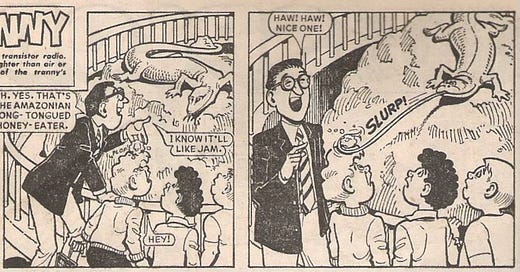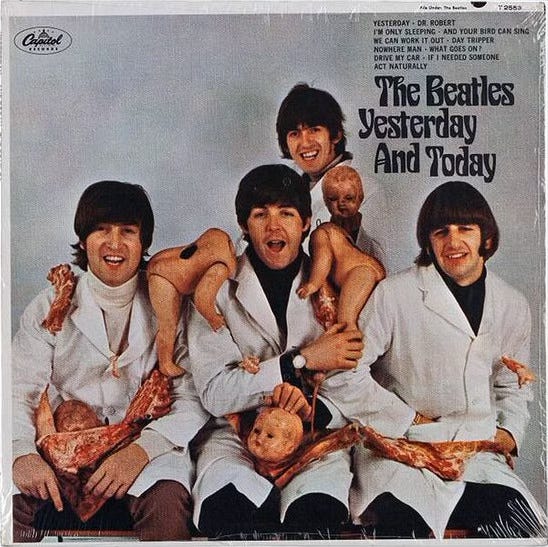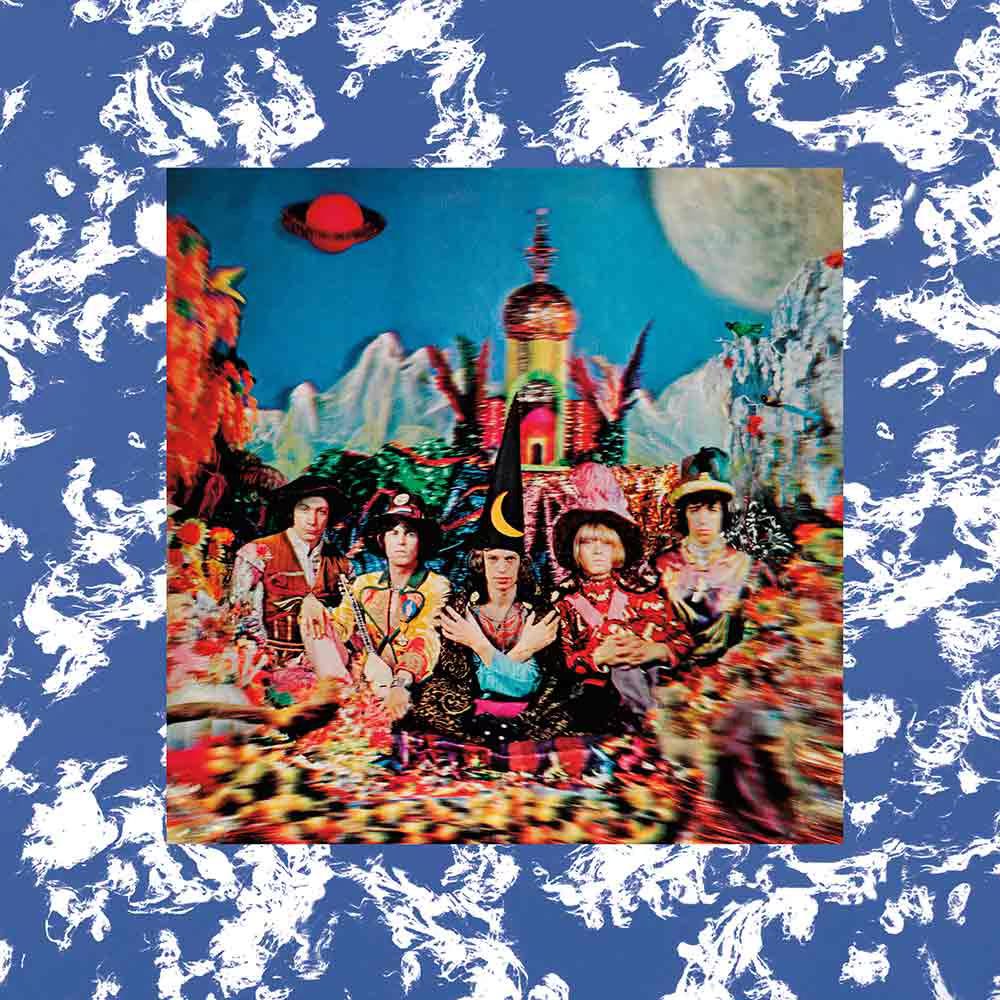In this series so far, I have written about Gnostics, Jungian alchemists, and mystical orgy and castration cults.
How did these fringe ideas become commonplace in Western societies today? I believe that the ‘British Invasion’ of popular music from the 1960's onwards helped spread esoteric notions of sex and gender around the world.
Long before Spotify, the jukebox and radio were disruptive technologies which enabled youth to experience separate culture from their parents, offering new attitudes which Mum and Dad couldn’t relate to. In particular, the mass production of the transistor by the mid 1950’s lead to pocket-sized radios, far more portable than the old thermionic wireless sets.
This innovation meant a teenager with a 'tranny' could listen to their kind of music in the privacy of their bedroom, or when out with friends. Nightclubs with their age restrictions weren’t accessible to these young people, but coffee bars with jukeboxes were. It was no longer necessary to visit a concert hall, or gather around the family's one wireless device to listen to music together.
Growing up in the 1970’s, I identified with the comic strip 'Danny’s Tranny', about a boy called Daniel whose transistor radio had amazing powers. As science fiction author Arthur C. Clarke put it, "Any sufficiently advanced technology is indistinguishable from magic".
In Britain, due to the choke-hold that the BBC had on radio broadcasting, only an hour or two of pop music were played per week in the era of rock n’ roll. By the early 1960's, 'pirate' radio filled the demand from youth by broadcasting from ships in international waters, beyond BBC and government reach. Sailors in the merchant marine brought fresh American records back to port cities like London and Liverpool, discs which were re-released by British labels for the teenage market.
To the youth of austere, stiff-upper-lip Britain, rock n' roll's sexual outlaws were beyond exciting. Little Richard was androgynous and flamboyant, praising Uncle John's friend 'Sally' from the alley who was both tall, and ahem... long. In those days, 'bald-head woman' was a euphemism for a feminine male, sans wig. Screamin’ Jay Hawkins was menacing and coercive, his priapic dominance secured with the power of voodoo. Guitarist and gospel singer Sister Rosetta Tharpe invented the tour bus because American hotels wouldn't rent rooms to black lesbian partners. Like her black male counterparts, Tharpe was enthusiastically received in Britain as a musical pioneer.
Living at a time when male homosexuality was criminalised and racial segregation was still an everyday reality, American rock n’ roll artists were truly breaking the boundaries of social convention. However, musicians weren’t all great role models when it came to sexual politics. Elvis Presley met his wife Priscilla when she was 14 years old, and Jerry Lee Lewis married his cousin Myra when she was just 13. Due to less than equal treatment for black artists, Chuck Berry served a year and a half in prison for pimping 14 year old Janice Escalanti, whether he had been guilty or not.
Little Richard’s tour-mate 'Buddy' Holly was produced by Norman Petty, who lived in a throuple with his wife Violet and her lover Norma Berry. Petty had built a state-of-the art recording studio which gave him full creative control as an independent producer, and Violet was an accomplished musician in her own right. All three partners are buried in the same grave in their home town of Clovis, New Mexico, with a triple headstone.
British recording engineer ‘Joe’ Meek sought to emulate Norman Petty's success and independence by building his own studio in London. Without Petty's budget, he built a multi-track tape studio in his flat, to the consternation of his neighbours. Meek was obsessed with science fiction, aliens and the occult. His 1960 outer space project 'I Hear A New World' was followed by 'death discs' for the teenage market, including ghost girlfriend hit ‘Johnny, Remember Me’ in 1961.
One of Joe's many artists, Screaming ‘Lord’ Sutch, was the first man on the London rhythm and blues scene to grow his hair long. He covered Little Richard’s ‘Good Golly Miss Molly’ with his band The Savages, at a tempo which would have left the Ramones out of breath.
Finding Meek's proposals too dark, Sutch suggested blending campy British horror cinema with rock n' roll voodoo, re-using Screamin’ Jay Hawkins stunt of being brought onstage in a coffin. The results included a cover of Clarence Stacy’s upbeat pop tune about murdering prostituted women, 'Jack the Ripper'.
BBC censorship of the 'death discs' only helped their popularity with the teenage market. Some of the musicians who worked with Sutch created the British ‘heavy metal’ sound.
In 1962 Joe Meek recorded the first number one record in the USA by an English group, the Tornados, thereby starting the British Invasion. Despite Buddy Holly having died in a plane crash years earlier, Meek would speak to him regularly in séances, using a Ouija board. Buddy's advice on the music industry wasn't completely reliable, as Meek decided to turn down Brian Epstein's band from Liverpool, called the Beatles.
Meek was much better with electronics than he was at business, and the money ran out. After his 1963 arrest for propositioning an undercover policeman in a public toilet, and blackmail attempts by former lovers, Meek's amphetamine-driven paranoia escalated. He would also turn down David Bowie and Rod Stewart, convinced that other producers were stealing his ideas. The Society for the Prevention of Cruelty to Long-Haired Men made its debut on British television in 1964, featuring Bowie under his real name of David ‘Davy’ Jones.
A year later, the long-haired Beatles played Shea Stadium in Queens, New York, engendering a genuine outbreak of mass hysteria among teenage girls who screamed so loudly that the members of the band couldn’t hear each other play. Beatles fans were known to faint on sight of their idols, or run in traffic in the hope of seeing John, Paul, George or Ringo through a limousine window. Social contagion didn’t start with the Internet.
American artists from the Doors to William Shatner wanted to copy the British Invasion sound of the Beatles, the Rolling Stones or the Kinks. But from the mid 1960’s onwards, as the musicians’ drug of choice changed from speed to weed and LSD, pop took a darker turn. John Lennon confused young Americans with his infamous ‘butcher’ cover concept for the ‘Yesterday and Today’ album in 1966.
The following year, while the band promoted the Maharishi Mahesh Yogi’s transcendental cult, it opted to include Aleister Crowley’s face on the ‘Sgt. Pepper's Lonely Hearts Club Band’ artwork. In February 1967, having failed to produce new hit records, Joe Meek murdered his landlady and then turned the shotgun on himself.
Meanwhile, Marianne Faithfull gave an English translation of ‘The Master and Margarita’ by Russian novelist Mikhail Bulgakov, in which the devil appears as a professor, to her lover Mick Jagger. The Rolling Stones released ‘Their Satanic Majesties Request’ in late 1967, with the album artwork featuring Jagger dressed as a wizard.
Jagger’s Crowleyesque phase lasted into the following year, when the track ‘Sympathy for the Devil’ was released, and filming began on his gender-swapped role in ‘Performance’. David Bowie conveyed his disturbed mental state via the song ‘Quicksand’ in 1971, managing to cram references to the Hermetic Order of the Golden Dawn, Aleister Crowley, Holocaust architect Heinrich Himmler, Friedrich Nietzsche and Buddha into one short tune.
British horror film studio Hammer capitalised on the sexual revolution and counterculture, releasing lesbian flick ‘The Vampire Lovers’, based on the novel ‘Carmilla’ by Sheridan Le Fanu, and ‘Dracula A.D. 1972’ featuring a groovy soundtrack and a genuinely disturbing hipster black mass scene. Led Zeppelin’s Jimmy Page purchased Aleister Crowley’s house overlooking Loch Ness in the Scottish highlands during the 1970’s. The property where Crowley attempted to create a portal to Hell has since burned down twice, in 2015 and 2019.
In 1973, Richard O’Brien created musical ‘The Rocky Horror Picture Show’, which Mick Jagger reportedly tried to buy the rights to after its stage debut in the USA. Jagger, Lou Reed and David Bowie supposedly all wanted the lead role in the 1975 film version, playing alien transvestite Dr. Frank N. Furter, but Tim Curry from the original theatrical cast prevailed. After fifty years of screenings, this movie is said to have had the longest theatrical release in film history.
Former Beatle George Harrison, the most invested in Eastern religion of the group, funded 1979 Monty Python movie ‘The Life of Brian’ giving us the classic ‘Loretta’ scene, in which Stan changes his pronouns. “It is symbolic of our struggle against oppression…”, the comrades agree, for Stan to have the right to become a woman, even though he can’t.
But it wasn’t all sing-along fun. Ozzy Osbourne’s 1980 track ‘Mr. Crowley’ was cited as an evil influence on impressionable children during the ‘Satanic Panic’ therapeutic recovered memory episode. Ozzy claimed that he was not a competent Satanist, and just like his bat-eating stunt, the track referencing Crowley had been created for attention. British rock musicians were accused of ‘backwards masking’ subliminal messages into their recordings. Both Ozzy Osbourne and the band Judas Priest were sued by parents of American fans who had committed suicide. There have been countless copycat heavy metal devil worshippers to this day.
Even the band Queen was accused of back-masking an instruction to smoke marijuana into ‘Another One Bites The Dust’, which if it had been true was probably the least subversive thing Freddie Mercury, real name Farrokh Bulsara, ever did. Although born in Africa, camp Freddie was descended from Iranian worshippers of Zarathustra.
During the Satanic Panic, recovered memory therapists discredited victims of actual abuse, by encouraging accusations without evidence. While a few artists and disc jockeys have faced a reckoning for their behaviour since, the music industry’s groupie culture as a whole has yet to have its #metoo moment.
Some British musicians went beyond mere performativity to fully emulate Aleister Crowley’s methods. Founder of the band Psychic TV, Neil Megson, had renamed himself ‘Genesis P. Orridge’ in 1971. Ten years later he created ‘Thee Temple ov Psychick Youth’ cult, which posed in Charles Manson T-shirts.
In 1993, ‘Orridge’ embarked on a feminised gender transition with his dominatrix Jacqueline Breyer. ‘Trans widows’ who believe their partner is trying to become them in every respect will note that ‘Orridge’ explicitly stated this was his transition goal, copying Jacqueline’s appearance down to her eye make-up. While the pair were supposedly creating a singular ‘pandrogeny’, Breyer did not masculinise, but also underwent a series of cosmetic surgery revisions. The link between elective cosmetic surgery and masochism was never clearer.
Genesis was quoted in 2004 as saying “We both went and got breast implants on the same day, on our 10th anniversary, and we woke up in hospital holding hands. By chance, we have the same size shoes, but now we can also share lingerie as well!” While Genesis lived to be 70 years old, Jacqueline was dead at 38.
Canadian indie band and Bowie worshippers ‘Arcade Fire’ released the track ‘My Body Is A Cage’ on their 2007 album ‘Neon Bible’. With its blasting church organ part, this song is an anthem for neo-Gnostics everywhere. It is a regular live favourite for the band, and was used in the soundtrack of HBO’s queer teen drama series ‘Euphoria’ which debuted in 2019.
Almost all of the features of the current gender identity malaise are present in the era of the British Invasion - disruptive technologies, parental alienation, cultural revolution, social contagion, mass hysteria and widening drug use causing real harms to the physical and mental health of young people.
The British Invasion was an economic success because white English musicians had taken the wildest black American music and sold it back to white America, at a time when music was segregated. When the Beatles were awarded medals by the Queen in 1965, this was primarily for boosting the nation's export revenue. But when musicians began to dabble in psychedelics, esoteric religion and dilettante Satanism, they became a vector for the export of fringe ideas about sex and gender which had previously been confined to syphilitic madmen and their female devotees in mystery cults.
So, when the youth of today tell you that you can't possibly understand the gender identity phenomenon, you can tell them that we've seen it all before. They are only repeating the cultural shift of their grandparent's time, only now with establishment support, thanks to memetic priming of the boomer generation.
The youth might do well to heed David Bowie's advice in 'Quicksand': "Don't believe in yourself. Don't deceive with belief."
Genspect publishes a variety of authors with different perspectives. Any opinions expressed in this article are the author’s and do not necessarily reflect Genspect’s official position. For more on Genspect, visit our FAQs.













Amazing article! It is a very original and unique survey of gnosticism in popular music. I loved the music and the seedy histories of the musicians.
Apologies that was supposd to read Stonewall, definitely not Genspect.